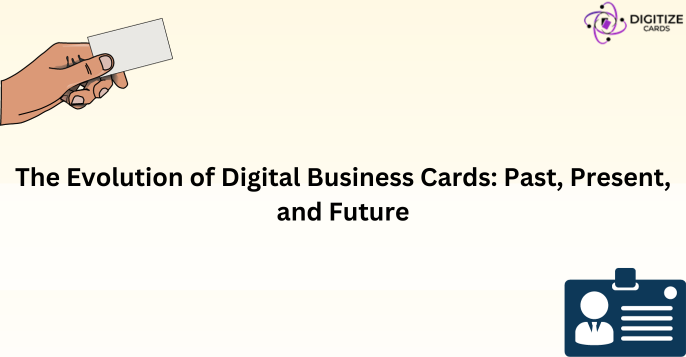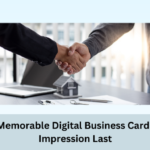In the fast-paced world of business, the exchange of contact information has been a longstanding tradition. For decades, the physical business card has served as the primary medium for sharing contact details and making a lasting impression. However, with the rapid advancement of technology, digital business cards have emerged as a modern alternative that is reshaping the way professionals connect and network. In this blog, we will explore the evolution of digital business cards, from their humble beginnings to their current state, and contemplate their promising future.
The Humble Beginnings
The concept of digital business cards has been around for quite some time, dating back to the early days of personal computers and the internet. In the late 1980s and early 1990s, electronic business cards were typically simple text-based files containing basic contact information, such as name, phone number, and email address. These digital cards were often exchanged via email or stored on floppy disks and later on compact discs.
However, these early attempts at digital business cards were limited in their functionality and accessibility. They were mainly used by tech-savvy individuals who had access to computers and email, which were not yet as ubiquitous as they are today. The evolution of digital business cards was still in its infancy, waiting for the right technological advancements to take off.
The Present State of Digital Business Cards
Over the past decade, digital business cards have undergone a significant transformation, driven by advancements in mobile technology and the rise of smartphone apps. Today, there are numerous dedicated mobile applications and online platforms designed specifically for creating, sharing, and managing digital business cards. These modern digital cards offer a wide range of features and benefits that have made them increasingly popular among professionals. Let\’s take a closer look at some of these features:
1. Multimedia Integration
Unlike traditional paper business cards, digital business cards allow for multimedia integration. Users can include not only text-based information but also images, videos, and links to their websites or social media profiles. This multimedia element adds depth to the card and provides recipients with a richer understanding of the cardholder\’s professional identity.
2. Easy Sharing
Digital business cards simplify the process of sharing contact information. With a simple tap or scan of a QR code, you can instantly share your digital card with others. This eliminates the need for printing and carrying physical cards, reducing paper waste and environmental impact.
3. Real-Time Updates
One of the most significant advantages of digital business cards is the ability to update information in real-time. When your contact details change, you can update your digital card, ensuring that anyone you\’ve shared it with always has access to your most current information. This is a stark contrast to physical cards that become outdated and require reprinting.
4. Analytics
Digital business card platforms often provide analytics that allow users to track how their cards are being viewed and shared. This data can be valuable for assessing the effectiveness of networking efforts and refining your professional strategy.
5. Accessibility
Digital business cards are accessible to a wide range of people, regardless of their tech-savviness. The widespread adoption of smartphones and user-friendly apps has made it easier for professionals of all backgrounds to create and use digital cards effectively.
6. Contactless Networking
In a post-pandemic world, contactless networking has become increasingly important. Digital business cards are a safe and convenient way to exchange information without the need for physical contact.
The Future of Digital Business Cards
As we look ahead, the future of digital business cards appears promising and full of potential. Several trends and innovations are likely to shape the evolution of digital business cards in the coming years:
1. Augmented Reality (AR) Integration
The integration of augmented reality (AR) technology into digital business cards could provide a unique and interactive experience. Users may be able to view 3D representations of products or engage in virtual conversations directly through their digital cards.
2. Blockchain Security
Blockchain technology could enhance the security and authenticity of digital business cards. By utilising blockchain to store and verify contact information, users can ensure the validity of the cards they receive and eliminate concerns about fraud or tampering.
3. AI-Powered Networking
Artificial intelligence (AI) can play a role in improving networking through digital business cards. AI algorithms could analyse your digital card interactions and suggest relevant connections based on your interests, industry, and goals.
4. Integration with Professional Networks
Integration between digital business cards and professional networking platforms like LinkedIn could streamline the process of connecting with new contacts. Users may be able to seamlessly import their digital cards into their profiles, making it easier to maintain a comprehensive professional presence online.
5. Customization and Personalization
Future digital business cards may offer even greater customization and personalization options. Users might be able to create unique designs and branding elements that truly reflect their individuality and professional identity.
6. Universal Compatibility
To truly replace traditional paper cards, digital business cards will need to achieve universal compatibility. This means developing standardised formats or protocols that work seamlessly across different devices and platforms.
Conclusion
The evolution of digital business cards has come a long way from their early, text-based beginnings. Today, they offer a dynamic and environmentally friendly alternative to traditional paper cards. With features such as multimedia integration, real-time updates, and analytics, digital business cards are reshaping the way professionals network and connect.
Looking ahead, the future of digital business cards holds exciting possibilities. Augmented reality, blockchain security, AI-powered networking, and increased customization are just a few of the innovations that could redefine how we exchange contact information in the professional world.
As technology continues to advance and adapt to our changing needs, it\’s clear that digital business cards are here to stay. Whether you\’re a seasoned professional or just starting your career, embracing this digital evolution can help you make lasting connections and stay ahead in the ever-evolving landscape of business networking. So, as you exchange your next digital business card, remember that you are part of a rapidly evolving tradition, shaping the future of professional connections.
To create your very own digital cards, visit Digitize Cards and go eco-friendly to create and share your digital business cards, embracing the future of networking. Digitize Cards strives to give unique personality to your cards, with lots of customization and colours and creativity available that lets you express your true self!
Digital cards are on the rise today, revolutionising the entire networking game! Be a part of this revolution, that not only helps your business, but conserves the environment too.



